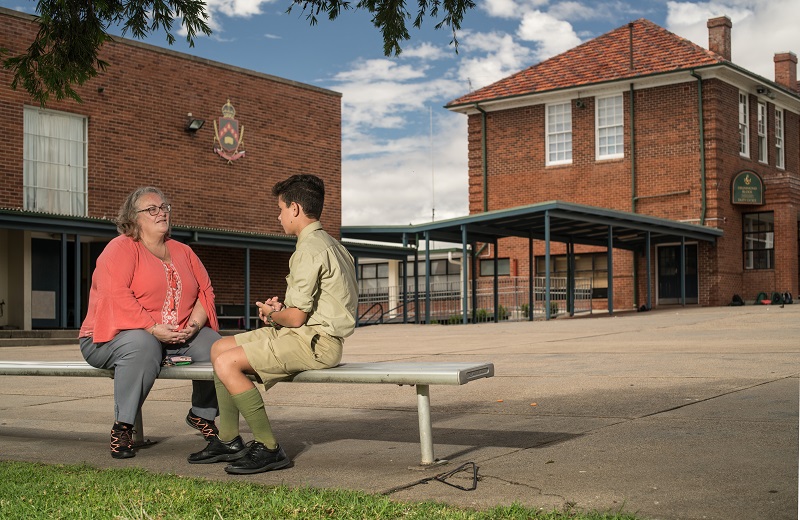Students across NSW are benefitting from a project pioneered by the University of New England (UNE) that’s welcoming social workers back to school.
More than 20 public primary, secondary and central schools are now hosting UNE social work students for placements in the final years of their studies. It’s giving the uni students valuable work experience and the schools much-needed support within their wellbeing teams.
And the Social Workers in Schools (SWiS) program has proven so successful that seven UNE graduates have gained employment in schools after their placements and other universities are looking to get on board.
SWiS project officer Scott Gartshore said what started as a program for rural and remote schools in north-western NSW has grown to include schools in the Central West, Hunter New England and even western and south-western Sydney. University students spend 500 hours in the schools, working in partnership with school counsellors and wellbeing staff to meet what he says is a growing need.
“Isolation and access to professional social workers is a big issue for many remote schools,” he said. “Most schools don’t have a full-time counsellor, and that counsellor may only visit one day a fortnight. Their workloads are heavy. SWiS is helping to fill the broader welfare and wellbeing gaps. But even in more urban schools, the consistent social worker presence is helping to build rapport with students and to bolster their emotional and mental health.”
Twenty-three UNE social work students have already completed the SWiS program and their host schools are reporting improved educational outcomes for students who are typically challenged by emotion regulation, anxiety, bullying and family/relationship issues.
“Our social work students relieve some of the workload from the school’s wellbeing staff and enable more students to seek help,” Scott said. “This is leading to improved relationships within the school, and within families, and therefore better school engagement.”
Margaret Mulcahy knows the benefits first-hand. She hosted two UNE social work students at her previous rural school and has welcomed another student at her new school – Eagle Vale, in south-western Sydney.
“In both schools, the UNE students have been very supportive of our wellbeing program, working one-on-one with students or in small groups to re-engage them with learning,” Margaret said. “They very soon become the go-to person. In my previous school, there was no such thing as a social worker, not even in the town. SWiS provided a service we couldn’t access unless we employed a social worker ourselves, and that’s exactly what we did following the success of SWiS. It’s working well at Eagle Vale, too. I think we will take two social worker students this year.”
The opportunity created a new career path for UNE graduate Susan Durham, who was employed at Farrer Memorial Agricultural High School in Tamworth soon after her 2016 placement. “I hadn’t envisaged a job in education, but the school created a position for a student support officer to be filled by a social worker and I applied,” she said.
“The school and staff have been very supportive and I work cohesively with the wellbeing team. I was the first social work student hosted by the school, and the third has also been employed here part-time. This term we will host our fifth student. It has enabled us to see more students and offer additional programs for smaller groups. I think it should be rolled out State-wide.”
Social workers were relatively common in NSW schools in the 1970s, however changes in policy over time resulted in a loss of the social worker role from state schools.
SWiS project lead, UNE’s Professor Myfanwy Maple, said the Department of Education’s Wellbeing Framework has provided a solid foundation for the SWiS program to be incorporated into schools, as an adjunct to existing school support services. “We have worked closely with schools to extend wellbeing support to students within the policy and funding environment of the department,” she said. “This has lead to strong partnerships and successful outcomes for our social work students on placement, as well as for school students benefitting from additional support services within schools.”
“We know this model is successful and we are working with the Department of Education to establish how it may be adopted across NSW,” said Scott, who has developed a position description that schools can use to recruit and appoint social workers. “It would be ideal to have an experienced social worker going into every school and working in partnership with the school counsellor.”
SWiS is funded through a Higher Education Participation and Partnerships Program (HEPPP) that aims to support rural and remote students as well as those from low socio-economic backgrounds. The goal is to work with schools and communities to improve their learning experiences and to build their aspirations to pursue tertiary education.


